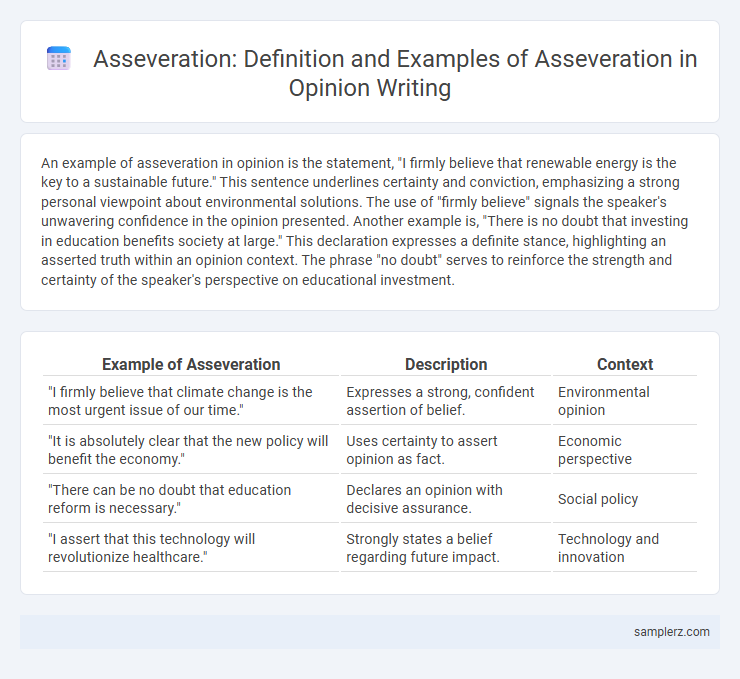An example of asseveration in opinion is the statement, "I firmly believe that renewable energy is the key to a sustainable future." This sentence underlines certainty and conviction, emphasizing a strong personal viewpoint about environmental solutions. The use of "firmly believe" signals the speaker's unwavering confidence in the opinion presented. Another example is, "There is no doubt that investing in education benefits society at large." This declaration expresses a definite stance, highlighting an asserted truth within an opinion context. The phrase "no doubt" serves to reinforce the strength and certainty of the speaker's perspective on educational investment.
Table of Comparison
| Example of Asseveration | Description | Context |
|---|---|---|
| "I firmly believe that climate change is the most urgent issue of our time." | Expresses a strong, confident assertion of belief. | Environmental opinion |
| "It is absolutely clear that the new policy will benefit the economy." | Uses certainty to assert opinion as fact. | Economic perspective |
| "There can be no doubt that education reform is necessary." | Declares an opinion with decisive assurance. | Social policy |
| "I assert that this technology will revolutionize healthcare." | Strongly states a belief regarding future impact. | Technology and innovation |
Defining Asseveration in Opinion Writing
Asseveration in opinion writing involves making a strong, confident declaration that reinforces the writer's viewpoint. This technique uses assertive language to convince readers of the validity and urgency of the opinion being presented. Clear examples include phrases like "I firmly believe," or "It is undeniable that," which emphasize commitment to the stated perspective.
The Role of Asseveration in Persuasive Opinions
Asseveration, a firm or emphatic assertion, strengthens persuasive opinions by conveying confidence and conviction, which can significantly influence audience reception. For instance, stating "I unequivocally believe that climate change policy must be prioritized to ensure future sustainability" demonstrates asseveration through the use of strong, definitive language. This linguistic tactic enhances the credibility and persuasiveness of the opinion by reducing ambiguity and emphasizing commitment.
Asseveration vs. Assertion: Key Differences
Asseveration involves emphatic or solemn declaration, often expressing certainty or strong conviction, whereas assertion is a straightforward statement of belief or fact without necessarily implying intensity. In opinion expression, asseveration conveys a higher degree of confidence and seriousness, impacting the perceived credibility and persuasiveness of the viewpoint. Understanding the distinction helps in analyzing rhetorical strategies and the strength of claims within argumentative discourse.
Classic Examples of Asseveration in Editorials
Classic examples of asseveration in editorials include emphatic statements like "It is undeniable that climate change demands immediate action" or "There can be no doubt about the necessity of economic reform." These declarative assertions strengthen the writer's argument by expressing firm conviction and leaving little room for opposition. Asseveration in editorials serves to persuade readers through confident and unwavering language, enhancing the overall impact of the opinion piece.
Asseveration in Everyday Opinion Pieces
Asseveration in everyday opinion pieces strengthens the writer's stance by confidently affirming beliefs or viewpoints, such as stating, "This policy unequivocally harms local communities." Such assertive declarations reinforce credibility and influence readers by presenting opinions as well-founded truths rather than mere personal preferences. The strategic use of asseveration enhances persuasive impact in blogs, editorials, and social media commentary.
Enhancing Credibility Through Asseveration
Asseveration in opinion writing, such as confidently asserting facts or personal convictions, significantly enhances credibility by demonstrating certainty and authority on the subject. Using explicit affirmations like "I firmly believe" or "It is undeniable that" helps establish trust and persuade audiences. This rhetorical strategy strengthens the writer's position and invites readers to accept their viewpoint as well-founded and reliable.
Common Phrases Signaling Asseveration
Common phrases signaling asseveration in opinion often include expressions like "I firmly believe," "there is no doubt that," and "undeniably true." These phrases emphasize the speaker's strong conviction, reinforcing the certainty of their viewpoint. Employing such assertive language enhances the persuasiveness and clarity of the opinion presented.
The Impact of Strong Asseveration on Readers
Strong asseveration in opinion writing asserts statements with confidence, significantly enhancing the credibility and persuasiveness of the argument. Readers are more likely to trust and be influenced by opinions that use unequivocal language and definitive claims, which conveys authority and conviction. This technique intensifies emotional engagement and reinforces the writer's stance, making the opinion more compelling and memorable.
Misuse of Asseveration in Opinions
Asseveration in opinions often manifests through exaggerated certainty, which can mislead readers by presenting subjective views as absolute facts. For example, stating "This policy is the worst decision ever made" disregards nuanced perspectives and weakens credible argumentation. Misusing asseveration undermines constructive dialogue by shutting down alternative viewpoints and fostering polarization.
Strategies for Effective Asseveration in Your Arguments
Effective asseveration in arguments involves confidently affirming your stance using clear, assertive language that leaves no room for doubt. Employing precise evidence and logical reasoning strengthens your assertions, making them more persuasive and credible. Reinforcing your position by anticipating counterarguments and addressing them decisively enhances the overall impact of your argument.

example of asseveration in opinion Infographic
 samplerz.com
samplerz.com